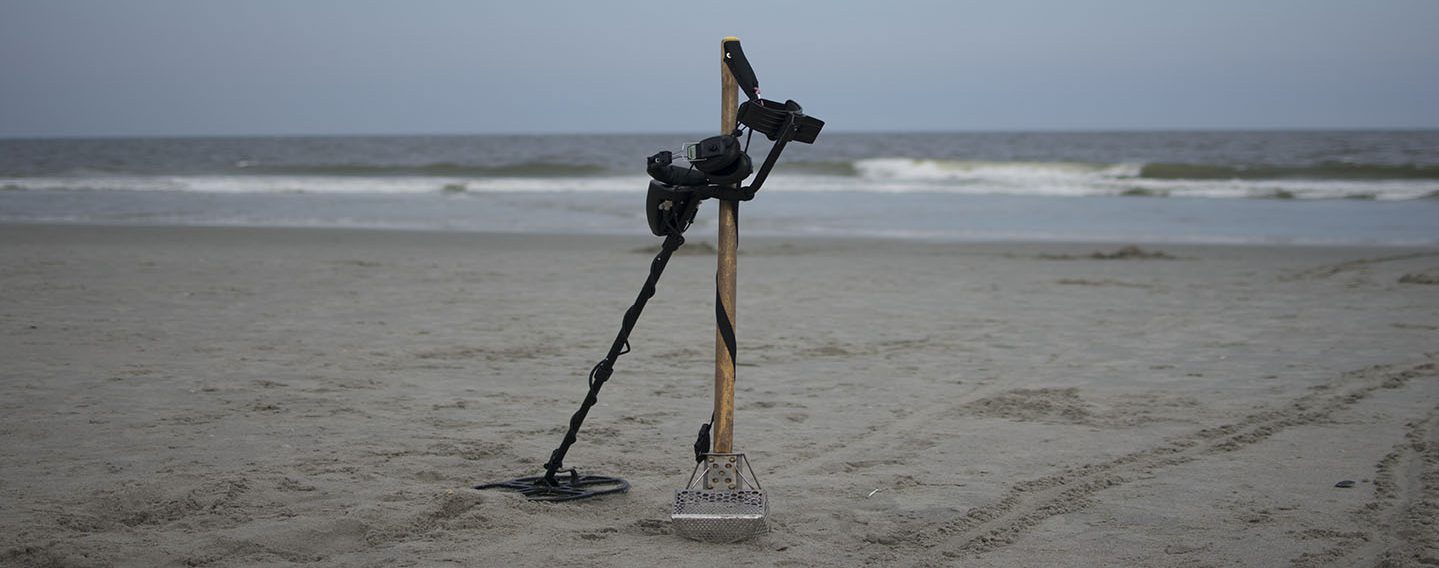
Tourism News
Lost Your Wedding Ring at the Beach? The Ring Finders Are Here to Help
Matt Fry has just found a ring on the beach. Covered in wet sand is a white gold ring, adorned with three diagonal diamonds, sitting inside Fry’s sand scoop. Nearly a football field away is Josh, who’s visiting Myrtle Beach from Arizona, still searching the beach for his late-father’s wedding band that was given to him on his wedding day. Josh sought Fry’s metal detecting and ring recovering expertise to help locate the cherished family heirloom.
“When Josh lost that ring I knew that it had a lot of sentimental value to him,” Fry says. “Particularly since he had lost his father early that spring…the sentimental value of that ring and what it meant to him was just beyond belief.”
Upon sifting the wet sand, Fry catches Josh’s attention from across the beach and pulls on his left ear, signaling a find in the sand scoop—what could best be described as a digging and sifting tool resembling an oversized cheese grater on a stick. In a full sprint, Josh races towards Fry, plucks the ring out of the sand scoop and wraps his arms around Fry as tight as he can. It’s his father’s wedding band.
“They say big boys don’t cry, but there were two of us crying on the beach that day,” Fry says with a smile.
Fry is a Ring Finder, part of a group of enthusiasts, hobbyists and do-gooders from across the globe—25 nations to be exact, with nine–including Fry–residing in South Carolina—that answer the call for help when a sentimental item goes missing. For nearly three years Fry has provided his services to the residents and visitors of the Grand Strand, searching for keys, phones, jewelry and rings on beaches, neighborhood roads, underneath boat docks and even in lakes.
“They all have stories about how they lost them,” Fry says. “When they do they feel embarrassed…they’re not the only ones that have ever lost a ring.”
Almost seven years ago, the worldwide network known as the Ring Finders was created by Vancouver native and fellow Ring Finder Chris Turner. Turner formed the global coalition by placing its members in one convenient online directory—TheRingFinders.com—with a universal goal to reunite people with their lost jewelry and heartfelt items. And for the past seven years, members have recorded over 3,000 finds, documenting their recoveries with pictures, videos and stories on their own personal profiles. A search result for Matt Fry on the website includes a handful of stories and pictures featuring smiling faces and successful recoveries from along the Grand Strand.
“I didn’t have to recreate the wheel,” Fry says about joining the Ring Finders. “It was just a natural fit.”
Right now Fry is at Public Access #6 of Garden City Beach, preparing to search for a missing wedding band that was lost somewhere between an oceanfront condominium and the shoreline just days before. The man who lost the ring contacted Fry, explaining his dilemma and providing as much detail as possible, including pictures and descriptions from memory. Fry grabs his metal detector, headphones and sand scoop from his truck and heads to the sand as gusts of wind slash the beach. Fry details his search plan, and before placing his headphones over his head, pulls on his left ear for good luck.
As a kid in California, Fry enjoyed coin collecting. But, unsurprisingly, money can be hard to come by for a kid, so Fry looked to a more frugal option: searching the California landscape for coins himself.
“I always wanted a metal detector to detect the ghost towns and things like that out in California,” Fry says, who at the age of 13 moved to Myrtle Beach. It wouldn’t be until a marriage and three kids later that Fry, who also owns his own custom sign shop, would begin to fulfill his childhood desire of metal detecting.
“It wasn’t something that was available to me at that time,” Fry says. “It’s become a thing I’ve enjoyed doing as a new hobby.”
Discovering a lost ring on the beach the day it was lost can be difficult enough, but searching days after proposes a much larger challenge says Fry, due to the changing tides and shifting sand slowly pushing the ring further underground like quick sand.
“Time is the biggest factor, because the ring, most of the time, will not move from where it’s been lost,” Fry explains. “It will stay in the general area cause it’s going to sink in the sand pretty quickly. The problem we have is when people call us a week later…the tide moves in and out. That ring sinks and gets below or deeper than our detectors can see them.”
Beeps and dings of high and low tones register through Fry’s headphones as he waves the metal detector over the sand like a magician waving a wand over a hat. In his other hand, Fry drags his sand scoop behind him, drawing lines across the beach to remind himself where he’s already searched. Every few minutes Fry will stop, dig up a plot of sand with the scoop and start sifting, hoping a hidden ring will expose itself. A few times Fry will uncover pennies, pull tabs and bottle caps, enemies of any Ring Finder. The trick, Fry says, is identifying the different tones that crawl through the headphones. A higher tone could indicate gold or platinum and a lower tone silver. But in the middle of the gold scale lies aluminum and other pesky metals.
Payment normally varies from Ring Finder to Ring Finder. For Fry, a call-out fee, such as travel and equipment expenses, is normally requested. And if a search is successful, Fry bases any payment amount on the sentimental value the owner places on the recovered item. Fifteen percent of any payment Fry does receive is donated to the Road Runners, a Shriners group that helps transport children and their families to Shriners Hospitals for Children across the nation.
“I don’t want my services to be determined by what you might have in your wallet,” Fry says. Any tips or donations are “based on what you think my time was worth and what it was worth to you to get your item back.”
“Somebody gets their lost ring or jewelry back, or phone, or keys, and I get a little bit for my hobby and the shriners win too.” Fry says. “Everybody wins.”
Nearly an hour has passed and Fry is still scanning the beach. Lines carved by his sand scoop intersect each other like a grid along the sand. Some beachgoers approach Fry, interested in his search. A group nearby signals to Fry, informing him that someone found an item around the same spot he’s been searching earlier in the day. Fry acknowledges that it could have been the ring he’s searching for, but his determination pushes any certainty to the side. Fry pulls on his left ear for good luck then places his headphones over his head and continues his search.
Watch the interview with Matt Fry below:
You can contact Matt Fry, as well as other Ring Finders, at TheRingFinders.com.


